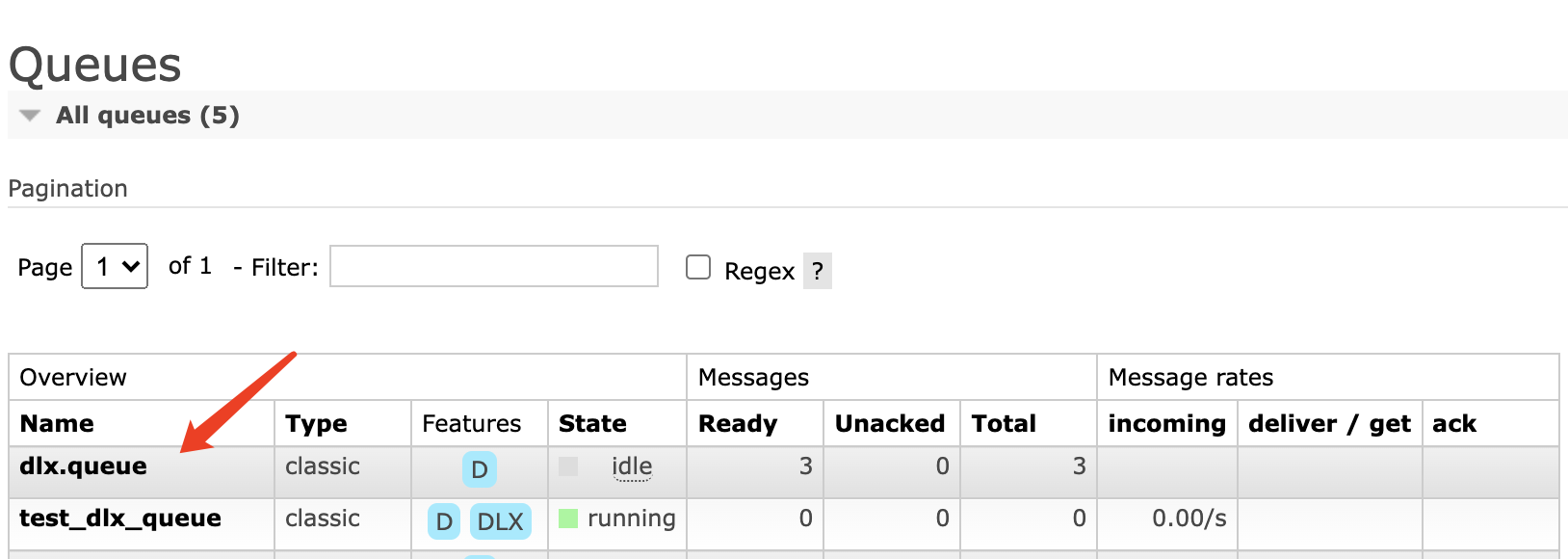RabbitMQ死信队列机制(七)
RabbitMQ的重回队列解决了RabbitMQ由于异常情况导致消息收不到的原因,但是一般在企业
不怎么实用重回队列,更多使用的是死信队列的机制,这样来保障消费端能够接收到具体的消息,
其实本质上都是为了消息消费者这层的可靠性的保障机制。
一、什么是死信队列
死信队列全名称是Dead Letter Exchange,所以私信队列简称是DLX,当生产者发送一个消息
后,消费端未接收到,那么这个消息就会到死信队列中来保障消息的消费。在RabbitMQ的消息消费的
处理机制中,当队列中存在死信时,RabbitMQ就会自动的切换到重新发布的Exchange中,从而理由
到新的队列机制来保障消费者这边消费数据。
二、死信队列使用场景
一般而言写代码都是需要私信队列的情况,那么到底是什么情况是需要考虑死信队列的情况了?
主要是如下几个场景中需要考虑死信队列的情况,具体汇总如下:
- 消费端需要接收的消息被拒绝接收(这种拒绝是非资源的一种行为)
- 消息的生存时间在过期的情况下
- 队列达到最大的长度的情况下
三、死信队列使用方式
在使用死信队列的时候,需要做的就是设置死信队列的Exchange和Queue,其实死信队列可以
更加简单的一种方式就是本应该正常的情况下发送消息到A中,当然这过程中A的Exchange和Queue是
没有任何的问题的,只不过在消息发送的过程中,可能由于A的消息队列达到最大,或者是TTL过期,以
及消费端被拒绝接收消息,那么在这种情况下,就会把消费端需要接收的消息切换到B中,那么这个B就
是死信队列,当然这中间死信队列的Exchange和Queue它的映射关系是没有任何的问题。
四、死信队列案例实战
4.1、生产者案例代码
package com.example.rabbitmq.dlx;
import com.rabbitmq.client.AMQP;
import com.rabbitmq.client.Channel;
import com.rabbitmq.client.Connection;
import com.rabbitmq.client.ConnectionFactory;
public class ProducerDlx
{
private static final String exchangeName="test_dlx_exchange";
private static final String routyKey="dlx.save";
public static void main(String[] args) throws Exception
{
ConnectionFactory connectionFactory = new ConnectionFactory();
connectionFactory.setHost("101.**.***.84");
connectionFactory.setPort(5672);
connectionFactory.setUsername("wuya");
connectionFactory.setPassword("java");
connectionFactory.setVirtualHost("/");
Connection connection = connectionFactory.newConnection();
Channel channel = connection.createChannel();
//通过channel来发送具体的数据信息
String msg = "Hello RabbitMQ QOS Message";
for(int i=0;i<3;i++)
{
AMQP.BasicProperties properties= new AMQP.BasicProperties.Builder()
.deliveryMode(2)
.contentEncoding("UTF-8")
.expiration("10000")
.build();
channel.basicPublish(exchangeName,routyKey,true,properties,msg.getBytes());
}
}
}
4.2、消费者案例代码
package com.example.rabbitmq.dlx;
import com.example.rabbitmq.MyConsumer;
import com.rabbitmq.client.Channel;
import com.rabbitmq.client.Connection;
import com.rabbitmq.client.ConnectionFactory;
import java.util.HashMap;
import java.util.Map;
public class ConsumerDlx
{
private static final String EXCHANGE = "test_dlx_exchange";
private static final String queueName="test_dlx_queue";
private static final String routingKey="dlx.#";
public static void main(String[] args) throws Exception
{
try{
ConnectionFactory connectionFactory=new ConnectionFactory();
connectionFactory.setHost("101.**.***.84");
connectionFactory.setPort(5672);
connectionFactory.setUsername("wuya");
connectionFactory.setPassword("java");
connectionFactory.setVirtualHost("/");
Connection connection=connectionFactory.newConnection();
Channel channel=connection.createChannel();
channel.exchangeDeclare(EXCHANGE,"topic",true,false,null);
Map<String,Object> arguments=new HashMap<String,Object>();
//要进行死信队列的申明
arguments.put("x-dead-letter-exchange","dlx.exchange");
//这个arguments属性,要设置到申明队列上
channel.queueDeclare(queueName,true,false,false,arguments);
channel.queueBind(queueName,EXCHANGE,routingKey);
//进行死信队列的申明(其实就看成一个正常的队列申明就可以了)
channel.exchangeDeclare("dlx.exchange","topic",true,false,null);
channel.queueDeclare("dlx.queue",true,false,false,null);
channel.queueBind("dlx.queue","dlx.exchange","#"); //#能够匹配到所有的路由
//设置手工签收的方式
channel.basicConsume(queueName,true,new MyConsumer(channel=channel));
}catch (Exception e){
e.printStackTrace();
}
}
}在使用死信队列的机制中,我们一定得申明死信队列的机制,也就是代码:
arguments.put("x-dead-letter-exchange","dlx.exchange");那么正常的情况下,本应该是把消息发送到test_dlx_exchange的Exchange中,然后发送到test_dlx_queue
的队列中,但是这仅仅是正常的情况,在异常的情况下,就会把消息发送到死信队列了,也就是发送到到新
的Exchange,该Exchange就是申明的dlx.exchange,此时消息也会发送到dlx.queue的队列中。
4.3、自定义接收消息
package com.example.rabbitmq;
import com.rabbitmq.client.AMQP;
import com.rabbitmq.client.Channel;
import com.rabbitmq.client.DefaultConsumer;
import com.rabbitmq.client.Envelope;
import java.io.IOException;
public class MyConsumer extends DefaultConsumer
{
private Channel channel;
/**
* Constructs a new instance and records its association to the passed-in channel.
*
* @param channel the channel to which this consumer is attached
*/
public MyConsumer(Channel channel)
{
super(channel);
this.channel=channel;
}
@Override
public void handleDelivery(
String consumerTag,
Envelope envelope,
AMQP.BasicProperties properties,
byte[] body) throws IOException
{
System.err.println("---------------consumer---------------\n");
System.err.println("consumerTag:"+consumerTag);
System.err.println("envelope:"+envelope);
System.err.println("properties:"+properties);
System.err.println("the message received:"+new String(body));
}
}4.4、死信队列演示


在如上的截图信息中,本来正常的情况下是会把消息给队列test_dlx_queue,我们也可以看到它是死信队列,但是
由于出现了异常的情况,最后我们可以看到消息从队列test_dlx_queue切换到dlx.queue,这样就能够即使在异常的
情况下消息依然能够接收到。感谢您的阅读,后续持续更新!关注我的公众号哦,技术文章更新不断。



 浙公网安备 33010602011771号
浙公网安备 33010602011771号